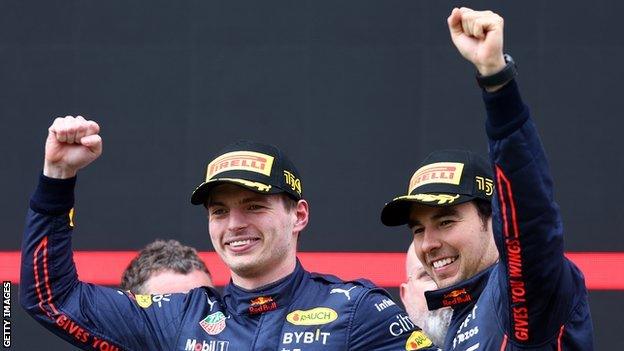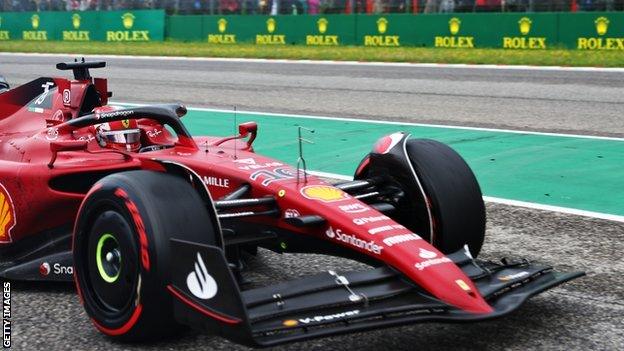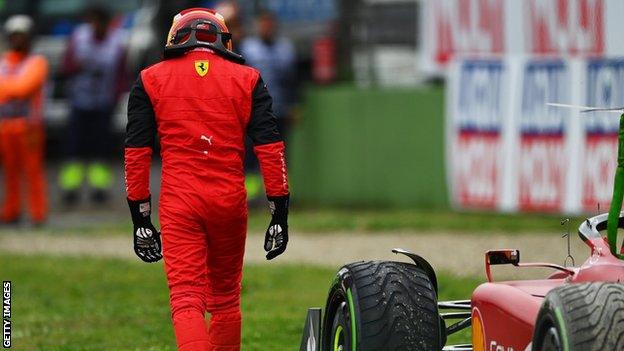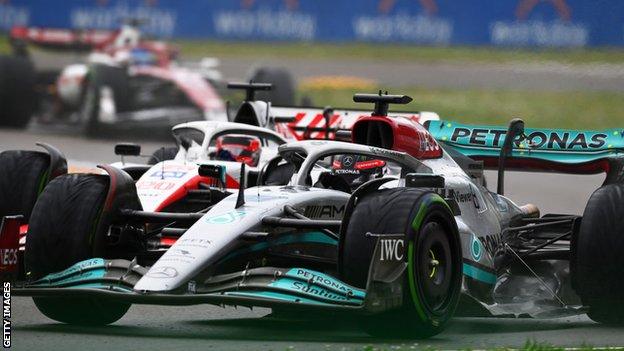Emilia Romagna Grand Prix: Max Verstappen takes advantage of Charles Leclerc error
- Published
- comments

Verstappen has now closed the gap on Leclerc at the top of the championship to 27 points
Max Verstappen expressed his sympathy for title rival Charles Leclerc after the Ferrari driver threw away seven points with a potentially costly error in the Emilia Romagna Grand Prix.
"It is easily done," Verstappen said. "He was pushing hard. It is painful, but he knows that himself. He doesn't need to hear that from anyone in here. But it is still such a long championship. It's not great, but you can't change it now. He doesn't do it on purpose."
Verstappen's remarks reflect the genuine respect between the two men who will contest this year's championship, and whose personal competitive history goes back to their childhood days when they were racing karts.
But they will be of little consolation to Leclerc, who knows that he made the sort of mistake that he can ill afford against a rival as consistent and formidable as Verstappen.
"I was too greedy," Leclerc said, "and I paid the price for it and lost seven potential points, compared to my third place I was before, so it is a shame.
"It's seven points that are valuable at the end of the championship for sure. And this shouldn't happen again."
Leclerc went into the weekend 46 points ahead of Verstappen. He left it with his lead cut to 27, and the Dutchman back up to second in the championship.
How did the error happen?

Leclerc tweeted after the race that he "gave it all" but had gone "over the limit"
Leclerc's mistake came because he had seen a brief glimpse of a result that had previously seemed impossible, and he was trying everything he could to grasp it.
Verstappen and team-mate Sergio Perez were on the way to a comfortable Red Bull one-two when Ferrari stopped Leclerc for another set of tyres with 13 laps to go. They saw an opportunity to attack Perez, who was coming up to traffic, and they hoped Red Bull would take the bait and also pit the Mexican.
They did, and from being more than two seconds adrift of the Red Bull before the stops, Leclerc suddenly found himself within a second.
The one place on the track Leclerc had been constantly quicker than Perez was at the Variante Alta chicane. After it, there are only the two Rivazza corners before the DRS overtaking zone. So Leclerc went for it, trying to get as close as he could.
But he took too much kerb at Variante Alta and the car bounced into a spin. He was lucky that he only lightly touched the barriers, and he was able to rejoin, pit for fresh tyres and a new front wing, and return to the track. The incident demoted him to ninth, but he was able to recover three places before the end.
"I saw the opportunity that before I didn't think it was there," Leclerc said. "All points count. And today I have put away seven points against the 15 we had if we were third. I will learn for the future. It is the way it is, I have analysed the data. I know what I have done and I will move on."
It was Leclerc's first significant mistake of the season, and it was reminiscent of previous errors from previous years, when Ferrari were less competitive and he would sometimes reach too far trying to get results the car did not deserve.
The same thing happened at Imola, but he knows he has to recalibrate his approach now he has a competitive car and he has to deliver every weekend if he is to sustain a year-long battle with Verstappen and Red Bull.
"Maybe this one is a bit different," he said. "It is a bit more the mental approach you had at that part of the race. But I have always been strong in knowing the feeling I had in that part of the race and how to correct it.
"It is a mistake and I learn from it and will not do it again. I have been a bit lucky because I have only lost seven points but it is seven that could be valuable at the end of the season."

It was miserable day for the tifosi as Leclerc's Ferrari team-mate Carlos Sainz crashed out of the race during the opening lap
Has there been a decisive shift in performance?
It was a difficult weekend for Ferrari. After dominating last time out in Australia, a track where they had expected Red Bull to have the upper hand, they thought Imola would suit them more.
But Ferrari's car is still in the same specification in which it started the season. Red Bull turned up in Italy with a couple of seemingly small upgrades and they seemed to have a slight edge from the start.
"We've had the upper hand in Bahrain and in Australia and they've had the upper hand this weekend and in Jeddah," Leclerc said. "So yeah, it is very, very close. And I think it will be that way for the rest of the season.
"Only time will tell how much of a step [Red Bull] did. Honestly, with Red Bull it is either one weekend they are stronger and another we are. It has been the case from the beginning of the season.
"I still think we are there more or less and it is track-dependent who is coming out on top. I don't think there are any significant differences yet, but yes they were a bit stronger than us this weekend."
Redemption for Red Bull
Remarkably, this was the first Red Bull one-two for nearly six years, since the 2016 Malaysian Grand Prix, and it was just what they needed to get their season back on track after a difficult weekend in Melbourne, where Verstappen had a fuel line break cause his retirement, his second in three races.
This was the context in which team principal Christian Horner called it "one of our best-ever results".
"It was important to take some points off Ferrari, which we have done in both tables and we will try and build on it in Miami," he said.
"Ferrari have a great car and great drivers. They have been unlucky here but they will be super-competitive in two weeks' time and I think it will be like this all season."
Verstappen, certainly, is not expecting this to be the start of a new Red Bull onslaught.
"Of course, we brought upgrades," he said, "but I don't know, of course, how much that actually gave us because of just the hectic weekend with, you know, rain, dry. It's very difficult to judge.
"I'm just very pleased with how we executed the whole weekend. We were just on top of everything a bit better than in Australia, and that's sometimes more important than actually bringing something new. I guess time will tell now in upcoming races how much the upgrades are benefiting us.
"They are still very fast and Miami can be again, very different."
Mercedes still looking for answers

George Russell drove brilliantly to finish fourth but Mercedes still face serious problems
The prospects of anyone else joining the two-way battle at the front look as distant as ever after Imola.
Lando Norris was outstanding for McLaren - as he was at the same track last year - and benefited from Leclerc's mishap to take the final podium place.
But although McLaren have moved forward significantly and consistently from their poor start to the season, Norris was about a second a lap slower than the Red Bulls and Ferraris, the sort of gap that in F1 tends not to be closed in a single season.
As for world champions Mercedes, George Russell starred, shooting up from 11th on the grid to sixth on the first lap, and might have challenged Norris for third had the team not had a technical failure at his pit stop and been unable to add the front downforce he needed to balance the car on slick tyres.
Lewis Hamilton, meanwhile, had what must be his worst weekend for years and finished 13th. In both the sprint race on Saturday and the main grand prix, he got stuck in what are known in F1 as "DRS trains", where a series of cars are running together, each has the benefit of the overtaking aid, and therefore no one can pass.
There is no reason to believe Hamilton would have been any slower than Russell had he been in free air, but he never got the chance to show his true pace. And after writing off Mercedes' title hopes on Saturday, the seven-time champion kept his utterances to the media to a bare minimum on Sunday.
The Mercedes car looked shocking out on track, its high-speed aerodynamic bouncing - or porpoising - on the straight appallingly bad.
Team boss Wolff apologised to Hamilton for this after the race, saying: "You see the bouncing on the main straight, I wonder how the two of them can even keep the car on the track at times."
"Except for the bouncing," Russell said, "the car feels really good to drive but the bouncing really takes your breath away. I hope we find a solution because it is not sustainable for the drivers.
"It is the first weekend I have been struggling with my back and chest pains from the severity of the bouncing. But it is what we have to do to get the fastest lap times out of the car."
Mercedes have to run the car at a higher ride-height than they want to keep the bouncing under some semblance of control. The problem is that before Mercedes can fix the issue, they need to understand what is causing it. And they don't.
Wolff said: "The fundamental issue that overshadows everything is that our car is porpoising more than others. And because of the bouncing we are not able to run it where it should run and that has huge ramifications on the set-up and the tyre grip, etc.
"We very much believe that the science we are putting in at the moment will help us to run the car lower, where we believe we have all the aerodynamic goodness.
"If we are able to get on top of that, there is quite some lap time we can find. If not, we need to have another idea."

Who are the best African footballers? Gary Lineker is joined by Micah Richards and Alan Shearer to rank the top 10
Is buying electric cars worth the extra cost? Look behind the claims and promises of changing to an electric vehicle

